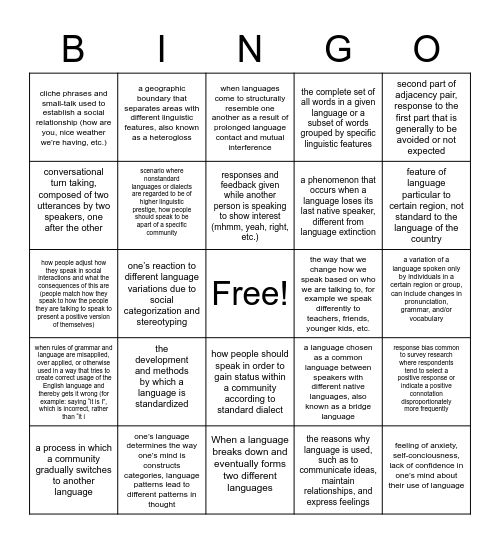

This bingo card has a free space and 24 words: the development and methods by which a language is standardized, one’s language determines the way one’s mind is constructs categories, language patterns lead to different patterns in thought, responses and feedback given while another person is speaking to show interest (mhmm, yeah, right, etc.), a process in which a community gradually switches to another language, second part of adjacency pair, response to the first part that is generally to be avoided or not expected, cliche phrases and small-talk used to establish a social relationship (how are you, nice weather we’re having, etc.), conversational turn taking, composed of two utterances by two speakers, one after the other, a geographic boundary that separates areas with different linguistic features, also known as a heterogloss, the way that we change how we speak based on who we are talking to, for example we speak differently to teachers, friends, younger kids, etc., how people should speak in order to gain status within a community according to standard dialect, a phenomenon that occurs when a language loses its last native speaker, different from language extinction, how people adjust how they speak in social interactions and what the consequences of this are (people match how they speak to how the people they are talking to speak to present a positive version of themselves), a language chosen as a common language between speakers with different native languages, also known as a bridge language, response bias common to survey research where respondents tend to select a positive response or indicate a positive connotation disproportionately more frequently, scenario where nonstandard languages or dialects are regarded to be of higher linguistic prestige, how people should speak to be apart of a specific community, the reasons why language is used, such as to communicate ideas, maintain relationships, and express feelings, a variation of a language spoken only by individuals in a certain region or group, can include changes in pronunciation, grammar, and/or vocabulary, when languages come to structurally resemble one another as a result of prolonged language contact and mutual interference, feature of language particular to certain region, not standard to the language of the country, one’s reaction to different language variations due to social categorization and stereotyping, feeling of anxiety, self-conciousness, lack of confidence in one’s mind about their use of language, when rules of grammar and language are misapplied, over applied, or otherwise used in a way that tries to create correct usage of the English language and thereby gets it wrong (for example: saying “it is I”, which is incorrect, rather than “it i, the complete set of all words in a given language or a subset of words grouped by specific linguistic features and When a language breaks down and eventually forms two different languages.
T'es branché Level 1 Unité 1 Culture | Persuasive Strategies | Anthropology Bingo | El silbo gomero Bingo | Persuasive Strategies
Share this URL with your players:
For more control of your online game, create a clone of this card first.
Learn how to conduct a bingo game.
With players vying for a you'll have to call about __ items before someone wins. There's a __% chance that a lucky player would win after calling __ items.
Tip: If you want your game to last longer (on average), add more unique words/images to it.